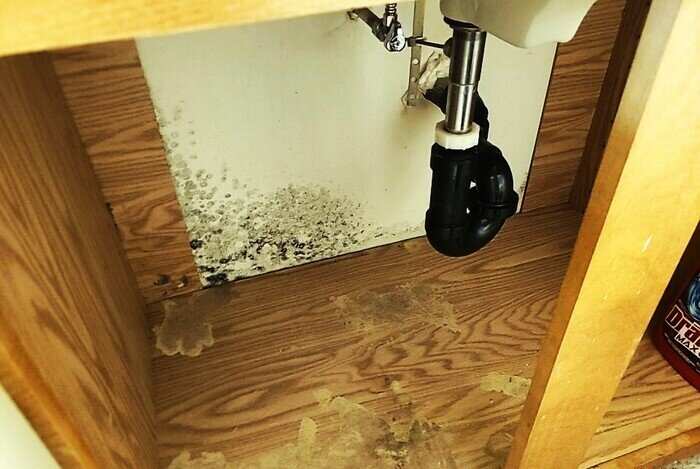Discovering mold in your apartment or rental home, or even feeling worried that there might be mold, is very stressful! Trying to figure out whether it’s your landlord’s responsibility — and whether to confront them about it — can be even more stressful. We’re Cleaner Guys, a professional mold removal company. We’re going to use our decades of experience to give you some answers. We’ve dealt with mold removal of all kinds in apartments, and we’ve dealt with a lot of insurance companies and landlords. Let’s give you a good idea of what you need to know moving forward. Read on.
Table of Contents
- What Causes Mold in An Apartment?
- Is My Landlord Responsible for Mold?
- Will Renter’s Insurance Cover Water Damage and Mold?
- How Do You Know If You Have Mold in Your Apartment?
- Key Takeaways
What Causes Mold in An Apartment?
Before we can talk about who’s responsible for mold in an apartment, it’s necessary to understand where it comes from. Mold is almost always the result of water damage in the apartment. Mold has to have moisture, oxygen, and a food source to absorb in order to grow. The average well-maintained home does not have enough moisture present for mold to take root. That’s why mold almost always starts growing after some sort of water damage, because it provides excess moisture. Sources of water damage can include leaks, a previously overflowed sink or toilet, a burst pipe, and more. As soon as there is excess moisture in an area, mold can take less than 48 hours to grow. Therefore, when talking about mold in an apartment, you have to know that mold and water damage almost always come hand in hand.
Is My Landlord Responsible for Mold?
Nearly always, determining responsibility for mold in an apartment depends on whose fault the source of the mold is. As previously stated, water damage is almost always the primary source of mold. So, in order to determine who is responsible for the mold, you must determine who is responsible for the water damage. There are some situations where the landlord is considered responsible for the water damage — and therefore the mold — and there are some situations where you, the tenant, may be held responsible for the water damage and ensuing mold. Let’s break down some of these situations, so you can determine which you fall into.
Situations When the Answer is Yes – Your Landlord is Responsible
Landlord/tenant laws and rights vary state by state in the United States (where Cleaner Guys is). Please note, we are not landlord/tenant law experts, or legal experts of any kind. You must consult your state’s or country’s landlord/tenant laws on your own, to determine the specifics for your situation. That being said, in our experience, in most cases, the landlord is responsible for maintenance of the building and its amenities. If the landlord neglects those duties, then any resulting water damage or mold is their responsibility.
For example, let’s say a pipe in your apartment starts leaking. You tell your landlord about it, but they don’t do anything about it for weeks or months. In that time, mold starts growing around the area of the leak. In this case, cleanup and repair of the water damage and the mold would be your landlord’s responsibility.
Another example would be if you moved into an apartment that already had an amenity that didn’t work correctly. This could be a toilet, shower head, faucet, etc. You alert your landlord about the malfunctioning amenity, but it causes water damage and mold before they fix it. You are not responsible for that repair.
Situations When the Answer is No – You are Responsible, Not Your Landlord
In our experience, you are responsible for cleaning up mold if your negligence or destructive behavior caused it. For example, say you mistakenly left a sink faucet on when you left, and it flooded your apartment. You tried to dry it out yourself without telling anyone, but it still causes mold later. That mold is your fault. You would most likely be at least partially financially responsible for the mold removal.
Or, as another example, let’s say you notice a leak, but you don’t alert your landlord to it. Your lack of action allows mold to grow from the leak. You will likely be considered responsible for that mold. Or, say you like taking long, steaming hot showers, but you never turn on a fan or open a window for ventilation, and so all that steam forms condensation on the walls, and eventually grows mold. That would be considered your fault as well.
An example of purposefully destructive behavior on your part would be if you pointed the shower head out of the shower stall on purpose, spraying water all over the bathroom, and it then grew mold. That would be considered your fault.
If water damage is ever your fault due to negligence, destructive behavior, or lack of appropriate communication with your landlord, you can likely be held liable to pay for most or all the repairs to the apartment, as well as any other nearby apartments that are damaged.
Mold from Another Unit?
What if the mold comes through your ceiling or walls from a neighboring unit? In that case, it’s obviously not your fault. The repair work that will have to happen in your apartment may inconvenience you. However, the responsibility for the repair will be between your neighbor and the landlord, not you.
Mold from a Natural Disaster – When It’s Nobody’s Fault?
If a weather event or natural disaster causes water damage in your apartment, the financial responsibility for its repair will usually fall on the landlord. However, if your negligence allows the weather to cause mold, you will probably be expected to take responsibility for its repair.
An example of negligence leading to water damage from weather would be if you left a window open when it was raining, and the rain got in and damaged the interior of your apartment. Another example would be if your landlord gave you specific instructions on what to do in your apartment to keep your pipes from freezing, and you didn’t follow them. If your pipes froze and burst in that case, it would probably be considered your fault, because you didn’t follow the instructions given by your landlord to prevent the disaster.

Will Renter’s Insurance Cover Water Damage and Mold?
Every renter’s insurance policy will vary on how it deals with mold. However, according to this article from Progressive Insurance, most renter’s insurance will cover mold if it “is caused by a covered peril on your renter’s insurance policy.” If covered water damage caused your mold, then it’s likely that coverage will extend to the mold as well. However, Progressive also states that “If the mold resulted from your negligence,” (as we previously discussed), “then you typically won’t be covered.”
Typically, landlords must have insurance on the apartment complex building, and this insurance usually covers damage to the building itself. You may have to financially contribute to the repairs out of pocket, depending on whether the water damage and mold were your fault or not.
How Do You Know If You Have Mold in Your Apartment?
The most obvious sign of mold is visibility; if you see black, green, or brown spots on your walls, it’s almost certainly mold. If you suspect hidden mold but don’t see any, there are signs you can look for. Some of them include:
- Musty, damp, or rotten odors
- Mold sickness symptoms that aren’t going away
- Bubbling, discolored, soft, or peeling drywall and paint
Read our extensive guide on all possible signs of hidden mold in an apartment here.
Key Takeaways
So, is your landlord responsible for mold in your apartment? As you’ve seen, the answer depends on the circumstance. If you cause the mold, you will likely have to take responsibility for its repair. However, if your landlord’s negligence causes the mold, despite your best efforts to address it, then it will most likely be their responsibility to cover the costs of fixing it.
You’ve also learned a few tips on spotting mold in your apartment, and what causes mold in the first place. We highly encourage you to browse our other popular articles that answer other pressing questions about mold. Check some of them out below!
➜ Can Mold in An Apartment Make You Sick? Answers here.
➜ Our Complete Ultimate Guide to Dealing With Mold in Apartments!
➜ Top 5 Ways How to Prevent Mold in An Apartment
➜ Is It Safe to Stay in An Apartment With Mold? Find out in this article.
If you find yourself in the unfortunate position of needing a professional water damage restoration company in Western Washington State, consider Cleaner Guys as a high-quality, well-trusted option. We’re proud to boast award-winning customer service, lower prices than others, and top-notch workmanship!
Disclaimer: This article is for informational purposes only. No part of this article is medical or legal advice, and may not be used as such. For all serious medical matters, consult your doctor. For all serious legal matters, consult your legal advisor. This article contains Cleaner Guys’ experience and opinions only.


